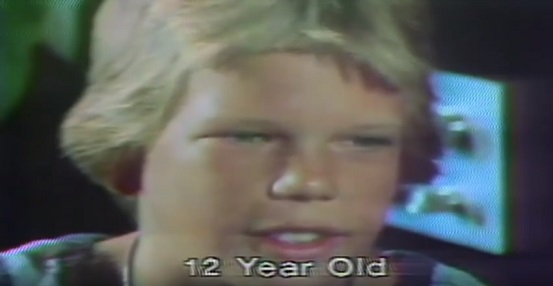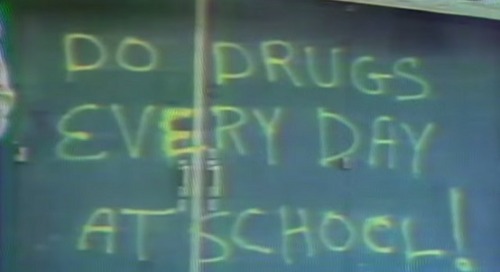Tune In Tonight: "Reading, Writing and Reefer"
The D.A.R.E. program was introduced when I was an impressionable middle schooler, and I came to it in a somewhat unique situation–both of my parents were heavy drug users at the time. My father was a purveyor and advocate of pot culture, right down to having a subscription to High Times, while my mother, a pioneer in controlled substances, used crystal meth. None of this was hidden from me, in fact often my dad would take me along with him for visits to his weed guy. Sometimes he was the weed guy.
Unsurprisingly, it was a bit odd (not to mention anxiety inducing) for me to have that going on at home, then go to school and be encouraged to take a Hitler Youth approach to drug use, turning in everyone you know who might be engaging in it, including your own parents if necessary, to the police. That experience left me with a great love for 60s through 80s era anti-drug propaganda. But come on, who doesn’t love it? Combining the hysteria of Reefer Madness with a desperate attempt to come off as hip and with it, it’s perfect party entertainment, whether you’re hopped up on goofballs or just Cool Ranch Doritos.
Reading, Writing and Reefer, which aired on NBC in 1979, warns parents of the scourge of “cannabis cigarettes,” and the rampant smoking of them by misguided, wayward youth. Hosted by a very grim, very serious Edwin Newman, it features a group of Florida teens (one of whom looks like a young Matt Damon) who live for nothing else but “copping a buzz” (you can practically hear the air quotes in Newman’s voice). All of them, even the young man who claims he quit a 100 joint a week habit, are flat-voiced and sleepy-eyed, as if a crew member shotgunned them immediately before the cameras started rolling, for maximum tsk-tsk effect.
Everyone insists that pot has done nothing but good things for them, yet also admit they’re all failing school and do little more than sit around and smoke all day (and get toddlers high, if one interviewee is to be believed). A very long explanation as to what being a “burnout” means is provided; evidently it’s smoking so much marry-juwanna that you’re no longer able to do anything but stay in your bedroom listening to music or watching TV. Minus the MJ, that was pretty much my teenage experience.
“What do you want to be when you grow up?” Newman asks a 15 year-old boy, who replies, as most 15 year-olds would, “copping a buzz” or not, that he doesn’t really know. “But you know you’re going to be a marijuana smoker, whatever it may be,” Newman sneers, to which the bleary-eyed teen agrees.
Though all of the teens claim everyone they know smokes more weed than a touring reggae band, the actual number cited in the program for teenagers who regularly used marijuana in 1979 was a not terribly shocking 11%,. One of the experts interviewed states with timorous drama in his voice that he expects that number to keep increasing, so that soon there’ll be a hopeless young pothead in nearly every home in every town in America (in fact, it plateaued and is now back to down to a little over 6%). As it is now, regular alcohol use among teenagers was significantly higher than marijuana use, but of course no one mentions that, and you can be sure that Edwin Newman and the crew relaxed with a couple of highballs after filming ended, satisfied at how they roasted these rotten kids and their wacky weedus.
The dangers of driving while high are discussed, as well as the legal risks involved as our children are doobieing their way towards becoming “a generation of outlaws.” You know the producers were just spitting blood when they couldn’t find anyone who died of a tragic marijuana overdose (like poor Becky, R.I.P.), or committed murder in a weed induced rage. Instead, they just have a bunch of high schoolers who all sound like Matthew McConaughey in Dazed and Confused talking about how much they love smoking pot, and if you’ve ever had to listen to someone talk about how much they love smoking pot, you’ll know it’s the most boring goddamn thing imaginable.
While it lacks the sadistic pleasure of Scott Baio almost accidentally killing his brother with a canoe paddle in Stoned, or a whacked out on angel dust Helen Hunt throwing herself out of a window in Desperate Lives, Reading, Writing and Reefer is amusing mostly because it posits that teens sparking a J every now and then is the greatest crisis facing the American family, when the country was literally about a year away from discovering crack and AIDS. Oh, if only that really had turned out to be the biggest problem, Edwin Newman. Oh, if only.








